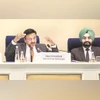Announcing the poll schedule for Jharkhand and Maharashtra Assembly elections, and for bypolls on 48 Assembly and two Lok Sabha seats across 15 states, Chief Election Commissioner (CEC) Rajiv Kumar on Tuesday described the electronic media’s practice of showing early trends on the counting day as “nonsense”.
The Election Commission (EC) announced that the 81-member Jharkhand Assembly will poll in two phases on November 13 (43 seats) and November 20 (38 seats). It said the 288-member Maharashtra Assembly will poll in a single phase on November 20. Of the bypolls, 47 Assembly seats, including nine in Uttar Pradesh and seven in Rajasthan, will poll on November 13.
The Wayanad Lok Sabha seat, which fell vacant after Congress leader Rahul Gandhi quit it as he was elected from Amethi too, will have its polling on November 13, while the Nanded Lok Sabha seat in Maharashtra will poll on November 20, as will the Kedarnath Assembly seat in Uttarakhand. Congress leader Priyanka Gandhi Vadra will contest from Wayanad.
The EC announced that the counting of votes for these elections will take place on November 23, which is just three days before the expiry of the term of the Maharashtra Assembly on November 26. The current Jharkhand Assembly’s term ends on January 5, 2025.
Kumar, while announcing the poll dates, flagged the need for better rigour and diligence in the conduct of exit polls. He asked the electronic media to introspect and asked its self-regulatory bodies, such as the National Broadcasting Standards Authority (NBSA), to look into the matter.
“We do not govern exit polls, but there is a need for self-introspection. What was the sample size, where was the survey done, how did the result come and what is my responsibility if I did not match to that result, are there disclosures — all of these (questions) need to be seen," Kumar said. "Counting happens roughly on the third day after the elections end. Expectations rise from 6 pm, but there is no scientific basis to this in public disclosure," he added.
"On the day of counting, results start coming (in the media) from 8.05 am. This is nonsense. My counting starts at 8.30 am," Kumar said, wondering whether the initial trends were shown in the media to justify exit polls. The CEC said the EC starts putting out trends or results on its website from 9.30 am onwards at two-hour intervals.
More From This Section
"It may take 30 minutes for the results to come on the official website," he said. "So, when the actual results start coming in, there is a mismatch. That mismatch can lead to serious issues sometimes. The gap between expectations and achievements is nothing but frustration," the CEC said. He also dismissed allegations of tampering of the electronic voting machines (EVMs) during the Haryana Assembly polls.
Bypolls to the Basirhat Lok Sabha seat in West Bengal and Milkipur in Uttar Pradesh were not announced as election petitions are pending for the two seats. The Trinamool Congress criticised the EC for not announcing the dates for the Basirhat bypoll, alleging that the poll panel was deploying a "delaying tactic" at the behest of the BJP.
The CEC also bemoaned urban apathy in voter turnout, especially in Maharashtra, which is why the polling days have been scheduled this time mid-week, on a Wednesday.
"Look at Gurgaon, look at Faridabad, recently, and last election Jubilee Hills, Hyderabad, Bengaluru South, Gandhinagar, Colaba, Pune, and Thane... all are much below state averages of each state," he said. In Maharashtra, turnouts in 62 of 64 urban assembly constituencies were less than the state average in 2019, as was the case in Lok Sabha elections, he said.
To a question on controversies surrounding women wearing hijab to polling booths and debate around democratic rights versus cultural rights, Kumar said identification of voters will be done exactly as per the rules but with full respect and regard to the cultural aspects of the area.
In the context of Nationalist Congress Party (NCP) leader Baba Siddique’s murder, Kumar said the EC will take a strict view on preventing violence, especially against political personalities.

)